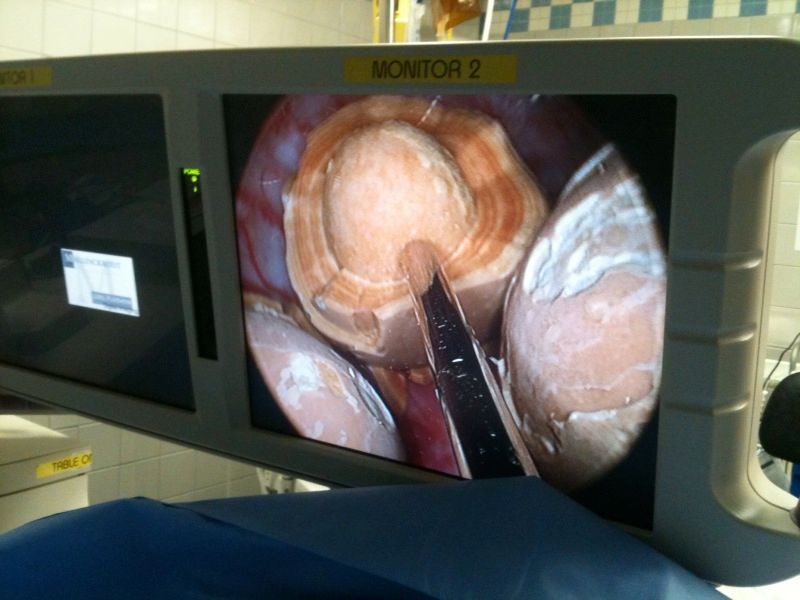Today's medical video
-
Bladder stone
***Gross stuff***
click to showThat's a pretty large stone. Here's an example of a stone I saw. The metal thingie is about half an inch in diameter, for a sense of scale.
They are using ultrasound to fracture the stone, and the smaller pieces will be passed without opening the patient. Note the layers of deposit on the stone as the interior is revealed.

-
-
Bladder stone
***Gross stuff***
click to showThat's a pretty large stone. Here's an example of a stone I saw. The metal thingie is about half an inch in diameter, for a sense of scale.
They are using ultrasound to fracture the stone, and the smaller pieces will be passed without opening the patient. Note the layers of deposit on the stone as the interior is revealed.

Popped like an Easter egg!
Speaking of stones
…..our nephew, 24, who lives in a “foreign country” suffers from kidney stones. He had a bout two weeks ago that laid him flat for a couple of days. I suggested that he refrain from drinking colas and replace them with dealcoholized near beer since the local tap water is likely a contributing factor to his kidney stones. Raw onions might help as well. Was I wrong?
-
Popped like an Easter egg!
Speaking of stones
…..our nephew, 24, who lives in a “foreign country” suffers from kidney stones. He had a bout two weeks ago that laid him flat for a couple of days. I suggested that he refrain from drinking colas and replace them with dealcoholized near beer since the local tap water is likely a contributing factor to his kidney stones. Raw onions might help as well. Was I wrong?
@Renauda diet does play a role in kidney stones.
Diet plays a significant role in the formation and prevention of kidney stones, which are hard mineral deposits that form in the kidneys. Certain foods and beverages can increase or decrease the risk of developing these stones, depending on the type of stone involved. The most common types of kidney stones are calcium oxalate stones, followed by uric acid stones, with other less common forms as well.
Key Dietary Factors Affecting Kidney Stones
- Oxalate-Rich Foods: For people prone to calcium oxalate stones, high intake of oxalate-rich foods (such as spinach, beets, nuts, and chocolate) can increase the risk. Oxalate can bind with calcium in the urine to form calcium oxalate crystals, which can then grow into stones.
• Reference: The Mayo Clinic notes that reducing oxalate intake and increasing dietary calcium can help reduce stone formation in those at risk for calcium oxalate stones . - Sodium Intake: A high-sodium diet can increase calcium levels in the urine, which in turn raises the risk of forming calcium-based kidney stones. The kidneys must process extra sodium, which promotes calcium excretion.
• Reference: According to the National Kidney Foundation, high salt intake is one of the key dietary factors that increase calcium in the urine and thereby contribute to stone formationnimal Protein**: High consumption of animal proteins (e.g., red meat, poultry, eggs) can increase the risk of kidney stones, especially uric acid stones. Animal protein increases the acidity of urine, which can lead to the formation of both uric acid and calcium oxalate stones.
• Reference: Harvard Health explains that animal protein can raise uric acid levels in the urine and reduce the urine’s citrate levels, which normally helps prevent stone formation . - **Contrary to previous beliefs, dietary calcium (from food, not supplements) may actually help prevent kidney stones by binding with oxalate in the digestive system, reducing the amount of oxalate that reaches the kidneys. However, calcium supplements can increase the risk of stones if not taken with food.
• Reference: Research from the National Institutes of Health highlights that adequate dietary calcium intake can be protective against kidney stones, especially when balanced with oxalate intake . - **Hydration*d intake is one of the biggest risk factors for kidney stones. When the body is dehydrated, urine becomes more concentrated, which allows minerals and salts to crystallize. Staying well-hydrated dilutes the urine, helping to prevent stone formation.
• Reference: The American Urological Association recommends drinking enough water to produce at least 2 liters of urine daily, which helps reduce kidney stone risk .
Practical Dietary Recs
• Limit sodium to no more than 2,300 mg per day.
• Moderate animal protein intake, especially red meat and shellfish, which are high in purines (leading to uric acid stones).
• Increase dietary calcium from food sources rather than supplements, especially when consuming oxalate-rich foods.
• Drink plenty of water to keep urine diluted, aiming for at least 8–10 cups per day unless otherwise directed by a doctor.By making these dietary adjustments, individuals can often reduce the risk of kidney stones, particularly if they have a history of stone formation.
- Oxalate-Rich Foods: For people prone to calcium oxalate stones, high intake of oxalate-rich foods (such as spinach, beets, nuts, and chocolate) can increase the risk. Oxalate can bind with calcium in the urine to form calcium oxalate crystals, which can then grow into stones.